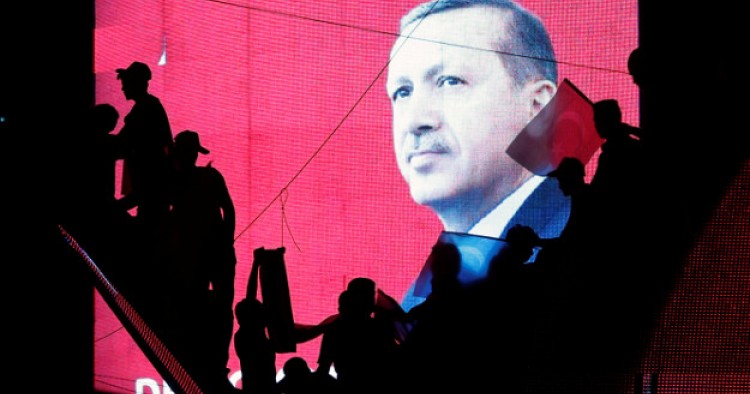In this week's Monday Briefing, MEI expert W. Robert Pearson provides analysis on the failed coup in Turkey and the impending crackdown on opposition. Marvin Weinbaum considers whether the unpopularity of Pakistan's government could put it at risk of a military coup of its own. And Charles Lister looks at how ISIS is adapting in the face of territorial losses in Iraq and Syria.
After the Coup—How Far Will the Crackdown Go?
W. Robert Pearson, MEI Scholar

Turkish President Recep Tayyip Erdogan has emerged triumphant in the aftermath of the failed July 15 coup attempt. He is having thousands of military personnel, civil servants and citizens jailed. So far, neither he nor Prime Minister Binali Yildirim has set any limit on those to be dismissed from jobs, arrested or indicted. Rumors are floating that the death penalty will be reinstated for the coup plotters. Against careful advice from the United States and other democratic leaders, Erdogan is adopting extreme measures.
The coup attempt—alien to any modern state—was a failure. Moreover, no political party, no institution, no national figure in or out of government joined those who launched this effort. The events themselves demonstrated without any doubt that across the full spectrum of Turkish society, Turks did not want the Turkish military to determine their future.
Yet thousands have been taken away, clearly without solid evidence, in an apparent effort to politically cleanse the government structure—military and civilian—of anyone thought possibly disloyal to the ruling Justice and Development Party. As for Fethullah Gulen, Turkey agreed under the mutual Turkish-U.S. treaty of 1979 to submit genuine evidence to support any extradition request. As of writing, Turkey has filed no new request. Fears are mounting that the government may be using the coup attempt as a pretext to move against unpopular groups and individuals who had nothing to do with the event.
Is a Pakistan Coup Attempt Next?
Marvin G. Weinbaum, Director of the Center for Pakistan Studies
Could something akin to the attempted coup in Turkey happen in Pakistan? The short answer is no, at least in that it would not have failed. Unlike this effort to overthrow the Turkish government, Pakistan’s coups have always been carefully planned and led by the army’s most senior officers, not its colonels. In Turkey, the military was believed to be loyal to the elected government, but in Pakistan no one doubts the ascendance of the military over the civilian government. Moreover, while the Turkish military’s rebellion was mounted against the regime of a demonstrably popular, adroit autocratic president, were a military coup undertaken in Pakistan today, it would come against a government viewed by many as ineffectual and incompetent.
Just several days ago, posters suddenly appeared in most of Pakistan’s major cities calling on the army chief to take over. Meanwhile, the country’s major political parties are united in their demands that Prime Minister Nawaz Sharif resign for corruption and attempts to hide his and his family’s wealth. The generals are also known to be displeased with Sharif’s attempts to intrude on their foreign policy-making turf, led by his conciliatory moves toward India. There is irritation as well with government attempts to gain some oversight of the military’s domestic security activities. Yet the probability of a military coup is low for now. The army’s senior command seems in no rush to be saddled with formal powers while enjoying most of the advantages of office without its responsibilities.
ISIS Adapting after Battlefield Losses
Charles Lister, Senior Fellow
After nearly two years of operations by a 66-nation coalition, ISIS has been placed definitively onto the back-foot in Iraq and Syria. Since the beginning of the coalition’s campaign, the group has lost 45 percent of its territorial holdings in Iraq and 20 percent in Syria. The foreign ministers of 46 countries will meet in Washington this week to discuss how best to build on this success. However, success on the battlefield appears to have intensified the threat of ‘inspired’ terror attacks around the world, with events in Nice being only the latest in a series of deadly attacks claimed in the ISIS name. Defeating or preventing this threat presents a challenge of far greater magnitude.
In Syria and Iraq, ISIS remains far from defeated. While reinforcing its core urban territory, the group is also adapting portions of its force structure in order to operate covertly, infiltrating key enemy pressure points to attack and instigate chaos. As it did post-surge from 2009-2014, ISIS is re-invigorating its Baghdad bombing cells and may seek to do the same in Damascus. ISIS will also seek to intensify sectarian dynamics by striking at symbolic Shiite and Alawite targets, with the Syrian Ismaili community in al-Salamiyah looking like a potential target of advancing ISIS militants northeast of Homs.
With attention focused on reinforcing coalition gains in Syria and Iraq, ISIS will also seek to spill its violence further into neighboring Lebanon, Jordan and Turkey. According to Syrian opposition sources, as many as 200 Lebanese ISIS fighters have already crossed back to the country, while the group operates capable support infrastructures in Turkey and Jordan. In some respects, the real fight has only just begun.
The Middle East Institute (MEI) is an independent, non-partisan, non-for-profit, educational organization. It does not engage in advocacy and its scholars’ opinions are their own. MEI welcomes financial donations, but retains sole editorial control over its work and its publications reflect only the authors’ views. For a listing of MEI donors, please click here.















